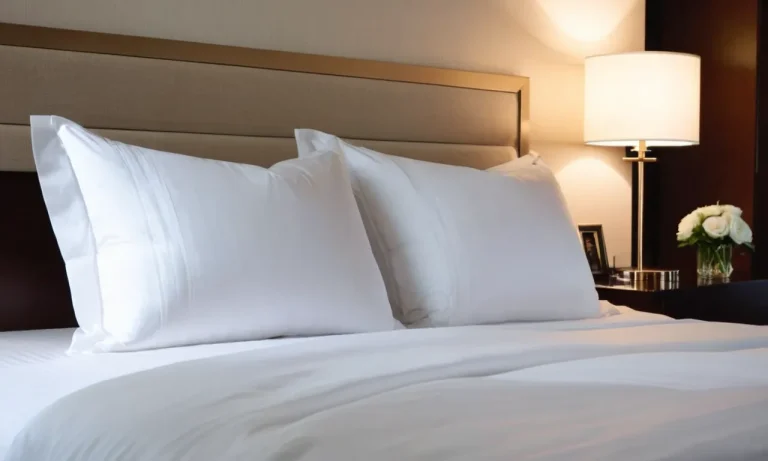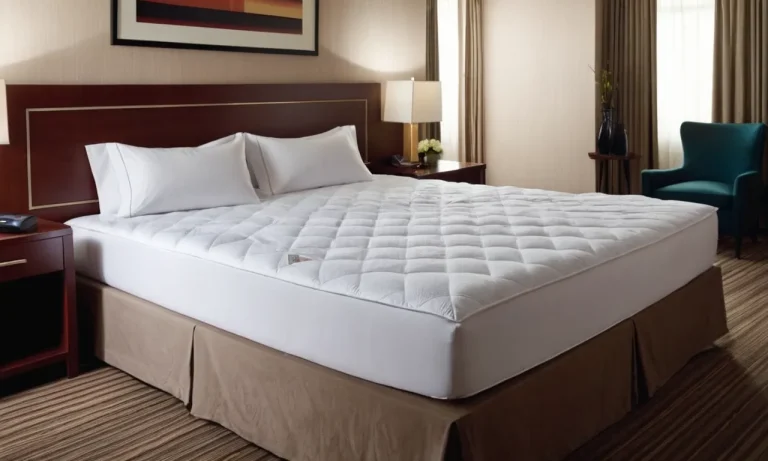The Downsides Of Staying In Airbnb: A Comprehensive Guide
Airbnb has revolutionized the way we travel, offering a unique and often more affordable alternative to traditional hotels. However, as with any accommodation option, there are potential drawbacks to consider before booking your next Airbnb stay.
If you’re short on time, here’s a quick answer to your question: The main disadvantages of staying in Airbnb include potential safety concerns, lack of consistent standards, limited guest services, and potential legal issues.
In this comprehensive article, we’ll delve into the various disadvantages of staying in Airbnb, exploring topics such as safety, cleanliness, guest services, and legal considerations. By understanding these potential drawbacks, you can make an informed decision and ensure a more enjoyable and secure travel experience.
Safety Concerns
While staying in an Airbnb can offer a unique and personalized travel experience, it’s crucial to be aware of potential safety concerns that come with this type of accommodation. Unlike traditional hotels, Airbnb properties lack standardized security measures, leaving guests vulnerable to various risks.
Lack of Standardized Security Measures
One of the primary downsides of staying in an Airbnb is the absence of standardized security protocols. Unlike hotels, which typically have 24/7 security personnel, surveillance cameras, and strict access control measures, Airbnb properties often lack these crucial safeguards.
According to a CNBC report, there have been instances where guests have faced issues such as theft, assault, and even undisclosed hidden cameras in their rental properties.
Potential for Undisclosed Hidden Cameras
The risk of undisclosed hidden cameras in Airbnb rentals is a significant concern for guests’ privacy. In 2019, a CNN investigation found numerous cases of hidden cameras in Airbnb properties across major cities.
While Airbnb has strict policies prohibiting such practices, the lack of standardized inspections and security measures makes it challenging to enforce these rules effectively. Guests should remain vigilant and report any suspicious activity or devices immediately.
Risks of Unauthorized Entry
Another potential safety concern with Airbnb rentals is the risk of unauthorized entry. Unlike hotels with strict access control and key card systems, Airbnb properties often rely on lockboxes or key exchanges with hosts.
This can potentially compromise the security of the property, as there is a higher risk of keys falling into the wrong hands or unauthorized individuals gaining access. According to a study by Inside Higher Ed, over 20% of Airbnb guests reported experiencing unauthorized entry during their stay.
😨 To mitigate these risks, guests should always double-check the locks and consider bringing additional security measures, such as portable door locks or alarms.
While staying in an Airbnb can be a great way to experience a destination like a local, it’s essential to prioritize safety and take necessary precautions. By being aware of the potential risks and taking proactive measures, guests can enjoy a more secure and worry-free stay.
After all, a relaxing vacation shouldn’t come at the cost of compromised safety. 👍
Inconsistent Standards and Cleanliness
One of the major downsides of staying in an Airbnb is the inconsistent standards and cleanliness that can be encountered. Unlike hotels, which adhere to strict guidelines and protocols for cleaning and maintenance, Airbnb properties are managed by individual hosts, resulting in varying levels of cleanliness and upkeep.
Varying Levels of Cleanliness and Maintenance
While some hosts take pride in maintaining a spotless and well-kept property, others may not prioritize cleanliness to the same degree. This can lead to situations where guests encounter unpleasant surprises, such as poorly cleaned bathrooms, dusty surfaces, or even pest infestations.
According to a survey by BeyondPrice, nearly 30% of Airbnb guests reported encountering cleanliness issues during their stay.
Lack of Professional Housekeeping Services
Unlike hotels that employ dedicated housekeeping staff, Airbnb hosts are often responsible for cleaning and maintaining their properties themselves. This can result in a lack of professional-level cleaning standards and attention to detail.
Guests may find that certain areas are overlooked or that the level of cleanliness does not meet their expectations. Additionally, hosts may not have access to the same specialized cleaning equipment and supplies used by professional housekeeping teams.
Potential for Inaccurate Listings and Misrepresentations
While Airbnb has guidelines for listing accuracy, there is always a risk of misrepresentations or inaccurate information provided by hosts. This can lead to disappointment when the property does not match the advertised description or photographs.
For instance, a listing may portray a pristine and well-maintained space, but in reality, the property may be in need of repairs or updates. According to a study by AirDNA, up to 20% of Airbnb listings may contain some form of misrepresentation, whether intentional or unintentional.
While Airbnb has implemented measures to address these issues, such as guest reviews and host accountability systems, the inherent nature of individual property management means that guests should exercise caution and thoroughly research listings before booking.
Ultimately, the inconsistent standards and cleanliness can detract from the overall Airbnb experience and leave guests feeling dissatisfied or misled.
Limited Guest Services and Amenities
While Airbnb offers a unique and often more affordable alternative to traditional hotels, it’s important to be aware of the potential downsides when it comes to guest services and amenities. One major drawback is the absence of on-site staff and concierge services.
Absence of On-Site Staff and Concierge Services
Unlike hotels, Airbnb properties typically don’t have a dedicated team of staff available around the clock to assist with your needs. This means you won’t have access to services like a concierge to help with restaurant reservations, attraction tickets, or local recommendations.
If you encounter any issues during your stay, you’ll need to rely on communicating with the host directly, which can be challenging if there are language barriers or response delays.
Lack of Consistent Amenities and Facilities
Another potential downside of Airbnb is the lack of consistent amenities and facilities across properties. While some hosts may provide amenities like a gym, pool, or on-site restaurant, these are not guaranteed.
According to Airbnb’s guidelines, hosts are only required to provide basic amenities like towels, soap, and toilet paper. This means that the availability of additional amenities can vary greatly from one property to another, making it difficult to plan your stay accordingly.
Potential for Communication Challenges with Hosts
Effective communication with your Airbnb host is crucial, especially if you encounter any issues or have special requests during your stay. However, communication challenges can arise due to language barriers, time zone differences, or simply unresponsive hosts. This can be frustrating and potentially impact the overall quality of your stay.
According to a survey by TrustData, 😕 around 15% of Airbnb guests reported communication issues with their hosts.
While Airbnb can offer a unique and memorable experience, it’s important to weigh the potential downsides of limited guest services and amenities against your travel preferences and expectations. By being aware of these potential drawbacks, you can make an informed decision and plan accordingly to ensure a more enjoyable stay.
🤔 Have you ever encountered any of these challenges during your Airbnb stays?
Legal and Regulatory Considerations
When considering an Airbnb stay, it’s crucial to understand the legal and regulatory landscape surrounding short-term rentals. These considerations can significantly impact your experience as a guest or host, and ignoring them can lead to potential legal issues or financial penalties.
Potential Zoning and Rental Restrictions
Many cities and municipalities have implemented zoning laws and rental restrictions that regulate short-term rentals like Airbnb. These regulations can vary widely, ranging from outright bans to strict limitations on the number of days a property can be rented or the types of properties allowed.
Failure to comply with these regulations can result in hefty fines or even legal action. It’s essential to research and understand the local laws before booking or listing a property on Airbnb. Resources like Airbnb’s Responsible Hosting page can provide valuable guidance.
Tax and Insurance Implications
Renting out a property on Airbnb can have tax implications for hosts. In many jurisdictions, income earned from short-term rentals is considered taxable income, and hosts may be required to report and pay taxes on their earnings.
Additionally, homeowners’ insurance policies may not cover damages or liabilities incurred during short-term rentals, potentially leaving hosts vulnerable. It’s advisable to consult with a tax professional and review insurance policies to ensure compliance and adequate coverage.
According to Nolo.com, a legal encyclopedia, “in the U.S., the IRS considers income from Airbnb rentals to be taxable income that must be reported on your tax return.”
Liability Concerns for Guests and Hosts
Both guests and hosts face potential liability concerns when using Airbnb. Guests may be held responsible for damages or accidents that occur during their stay, while hosts could be liable for injuries or incidents on their property.
It’s crucial to review the terms and conditions of the Airbnb platform, as well as any local laws or regulations regarding liability and insurance requirements. Airbnb does provide Host Protection Insurance and Guest Travel Insurance programs, but these may not cover all scenarios.
Additionally, hosts should consider obtaining additional liability insurance or consulting with a legal professional to mitigate potential risks.
While Airbnb offers a unique and often more affordable alternative to traditional accommodations, it’s essential to be aware of the legal and regulatory considerations that can impact your experience.
By staying informed and taking proactive measures, both guests and hosts can navigate the legal landscape and enjoy a safer, more secure Airbnb experience. Don’t let these considerations discourage you, but rather empower you to make informed decisions and mitigate potential risks.
Conclusion
While Airbnb offers a unique and often more affordable travel experience, it’s essential to be aware of the potential disadvantages associated with this accommodation option. From safety concerns and inconsistent standards to limited guest services and legal considerations, these factors can significantly impact your overall travel experience.
By understanding these drawbacks, you can make an informed decision and take necessary precautions to ensure a safe and enjoyable stay. Whether you choose to book an Airbnb or opt for a traditional hotel, prioritizing your safety, comfort, and peace of mind should be at the forefront of your travel planning process.
Remember, knowledge is power, and being well-informed about the potential downsides of Airbnb can help you navigate the world of alternative accommodations with confidence and make the most of your travel adventures.








